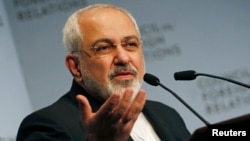Negotiators for Iran and the five permanent members of the U.N. Security Council and Germany, known as the P5+1, have held a series of talks in New York on Iran's nuclear program this week, ahead of plenary negotiations on Friday. A senior U.S. administration official said it is clear that negotiators on both sides have come to the city to “go to work.”
A senior administration official described this week's bilateral meetings between Iran and the U.S. as “constructive” and said a lot of hard, technical work that will need to be part of a comprehensive agreement on Iran's nuclear program is being undertaken by all parties.
Iran and P5+1 negotiators are working against a November deadline to reach an agreement on uranium enrichment and the overall scope of Iran's nuclear program.
Iran is seeking relief from sanctions. Western negotiators are seeking assurances that Iran is not trying to develop nuclear weapons.
Richard Einhorn, a non-proliferation expert at the Brookings Institution, said that at this point of the negotiations, a large part of the burden rests on Iran.
“I think Iran needs to recognize that if there is a deal, they will need to accept some real limitations on their uranium enrichment capacity during a comprehensive agreement,” said Einhorn.
Einhorn said he believes this is a difficult choice for Iran to make.
Kelsey Davenport of the Arms Control Association said both sides will need to be willing to move more towards the center on the issue of uranium enrichment.
“What we have heard, both coming out of Iran, and coming out of the United States, are very extreme positions on uranium enrichment,” said Davenport.
A senior administration official said that if progress is made, the talks in New York could continue on the sidelines of next week's U.N. General Assembly.




